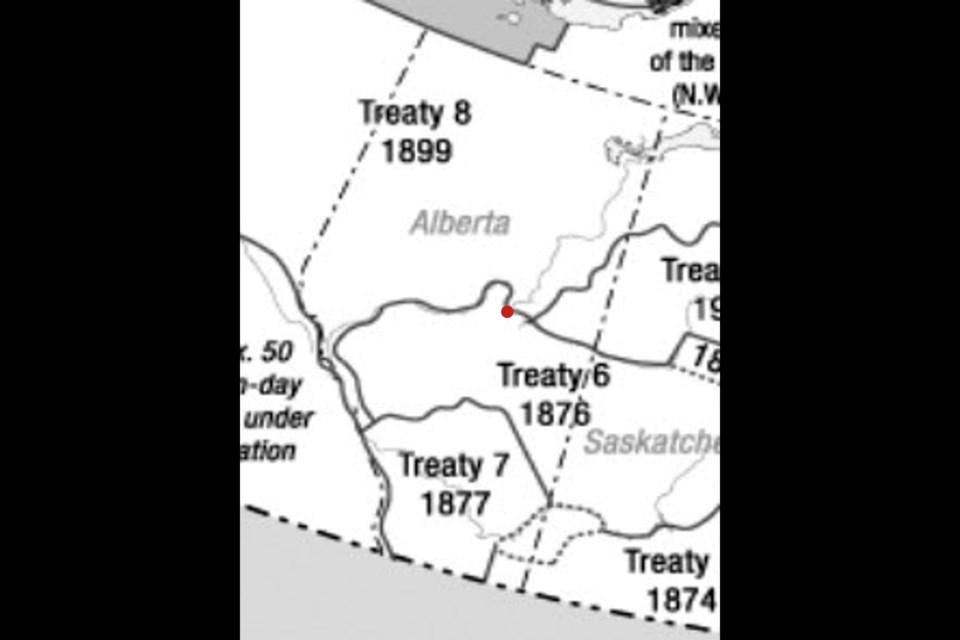ATHABASCA – The Town of Athabasca will acknowledge that it sits upon and operates on traditionally Indigenous land, but what exactly that statement will say is still up in the air.
At its March 15 meeting, Athabasca town council got its first update from the land acknowledgement sub-committee that was formed soon after the current council was elected last October and passed a motion with a 6-1 vote to adopt a land acknowledgement “recognizing that we are on Treaty 6 and Treaty 8 land, at the beginning of Town of Athabasca regular and special council meetings, and town-led events and on the website.” Coun. Dave Pacholok was the lone vote against.
Coun. Edie Yuill brought forward the original motion in October and volunteered to sit on the sub-committee and was joined by Coun. Sara Graling and Coun. Jon LeMessurier. Council also heard from Alma Swan, a local member of the Bigstone Cree Nation and daughter of a residential school survivor, at a November meeting, who explained the importance of the Truth and Reconciliation Commission and its 94 calls to action — one of which encouraged governments to change policies and programs to help repair the harms of colonization.
“They wanted all communities that have colonists living in them to respect the land that was walked on by those who were here before the colonists moved here, and that is part of the Canadian government's Truth and Reconciliation Report,” Yuill said, noting she originally brought the topic forward in the hopes of helping others understand what happened in the past.
Coun. Ida Edwards said she recognized it’s a difficult subject, but it’s also important to encourage healing, and part of that is acknowledging the original inhabitants of the land.
“I think it is a difficult subject, especially in light of what people who did come here and colonized Canada did for work and how hard it was to live here. A land acknowledgement acknowledges that people were living here before we came,” she said. “There's a stream of healing that's happening in regards to residential schools, in regards to the land being taken over and colonized, and none of us can understand the impact of it.”
Pacholok said he was expecting more data from the sub-committee about what other municipalities were doing in respect to land acknowledgements and remained consistent in his earlier opinion that such a practice may do more harm than good. He also requested a recorded vote.
“I am still confused about the actual reasoning behind this. Again, my thought process is that we create more hard feelings than we do actual reconciliation with this particular motion, and I'm concerned about it if we're the only ones following this path from around our area, or even towns our size,” he said. “I'm just curious about the information we didn't get. We had Ms. Swan come and give us some information but to be honest with you, I didn't really learn a lot from what she said.”
LeMessurier also referred back to Swan’s presentation where she said it was important to have an understanding of why a land acknowledgement was being adopted, and he suggested perhaps bringing in an elder to further explain its significance to council.
Yuill also brought two tentative options to the meeting. The first reads: “The Town of Athabasca respectfully acknowledges that we are gathered on traditional territories, home to many First Nations, Métis, and Inuit. We recognize the traditional territories of Treaty 6 and Treaty 8 and also recognize the homelands of the Métis Nations of Alberta. We acknowledge and appreciate the diverse history, rich cultures and contributions of all the Indigenous peoples of this province whose footsteps have marked this land for centuries.”
The second option: “The Town of Athabasca respectfully acknowledges that we are gathered on not one, but two treaty territories, Treaty 6 and Treaty 8, which are traditional meeting grounds, travelling routes to the Cree, Saulteux, Blackfoot, Dene, Nakota Sioux and the traditional homeland of the Metis. We acknowledge and appreciate the diverse history, rich culture and contributions of the First Nations, Metis, and Inuit whose footsteps have marked this land for centuries.”
After some discussion about the wordiness of the second option, Yuill said she would consult further with Swan and elders from both treaty areas and come back to council with their recommendations.


